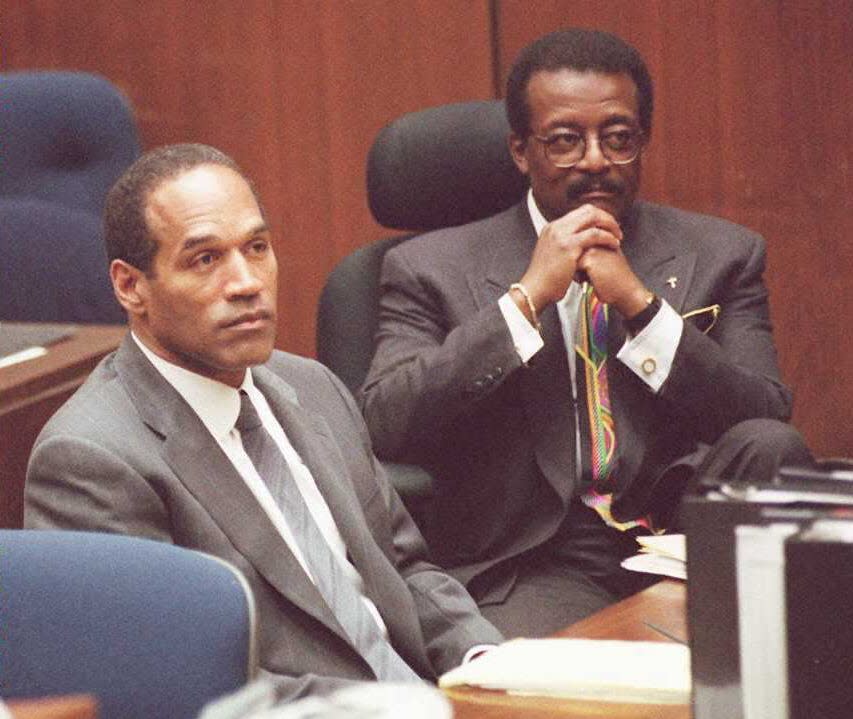How the O.J. Simpson trial changed public perception of criminal prosecutions

"It's finally official ― murder is legal in the state of California." These words, spoken by anchor Norm Macdonald on the Oct. 7, 1995, edition of "Saturday Night Live’s" Weekend Update, perfectly sum up the public perception of the O.J. Simpson trial at the time. The multi-hyphenate Simpson, already a household name when Nicole Brown Simpson and Ronald Goldman were murdered in 1994, saw his prominence rocket into the stratosphere as he found himself at the center of the highest-profile criminal case of the last hundred years.
The Simpson trial has elicited strong reactions and wildly different interpretations since the verdict. Some see it as an unforgivable miscarriage of justice, while some see it as a referendum of sorts on the decades-long history of institutionalized racism in the Los Angeles Police Department during the 20th century. Perhaps the most abiding legacy left by the Simpson trial, though, is the public’s perception of criminal prosecutions and the role of defense attorneys. O.J. Simpson’s acquittal convinced many people that Norm Macdonald was right: A defense attorney’s job is to help their guilty clients get away with murder.
This misconception has always been present, but has only become more prominent in the wake of the Simpson verdict. Thanks to Simpson’s “Dream Team” of superstar lawyers, many in the general public still see criminal defense attorneys as pantomime villains whose job is to obfuscate facts and confound noble prosecutors’ attempts to find justice.
More: Give Us The Truth About O.J. | A sportswriter's 1994 commentary on O.J.'s guilt or innocence
This mindset fundamentally misunderstands the role of defense counsel. Defense attorneys are not defending a guilty individual’s right to commit crimes. Rather, they defend the constitutional rights of the accused regardless of their guilt or innocence. Perhaps the most important responsibility defense attorneys have is to hold law enforcement and the overwhelming power of the criminal justice system to the highest possible standards.
Criminal defense attorneys do not try to suppress evidence because they want to hide their clients’ actions from the court or the jury. But when their clients’ Fourth Amendment rights have been violated because the police violated their right to privacy, the fruits of the illegal actions of police should not be held against a defendant.
More: O.J. Simpson dies of prostate cancer at 76, his family announces
People also often misunderstand defense attorneys’ relationship with the truth. They assume we lie for our clients or try to confuse the jury as Simpson’s lawyers did through Robert Shapiro’s strategy of “playing the race card.” As a result, defense attorneys constantly have to answer the question: “Would you be able to defend someone you knew was guilty?”
Defense attorneys do not only accept innocent clients. Guilty individuals have the same constitutional rights as innocent people. State and federal law enforcement are extremely capable, and most criminal cases end with either convictions at jury trial or plea agreements due to competent investigative work.
However, nothing happens in a vacuum, and little that happens is ever black and white. Often, it is a defense attorney’s job to navigate the gray areas where the vast majority of events occur. Prosecutors and judges often see a defendant for the first time as a name on a piece of paper next to a set of charges and a stack of police reports. A defense attorney sees a defendant for the first time as a scared person who may have made a serious mistake and needs help sorting it out. Most defendants are not perfect, but they are also more than their mistakes. Just like any of us, they are human and deserve to have their stories told.
Despite the widely held opinions about the erroneous verdict reached in O.J. Simpson’s case, we do not help our clients get away with murder. But we also do not let the state get away with circumventing the constitutional rights of the accused. Our most important job, then, is protecting our clients ― innocent and guilty alike.

Edward M. Blau is a criminal trial lawyer in Oklahoma City.
This article originally appeared on Oklahoman: How O.J. Simpson trial changed how the public views defense attorneys
